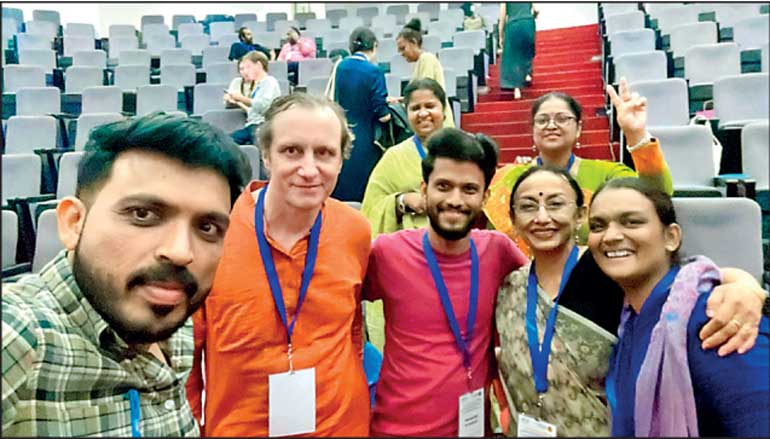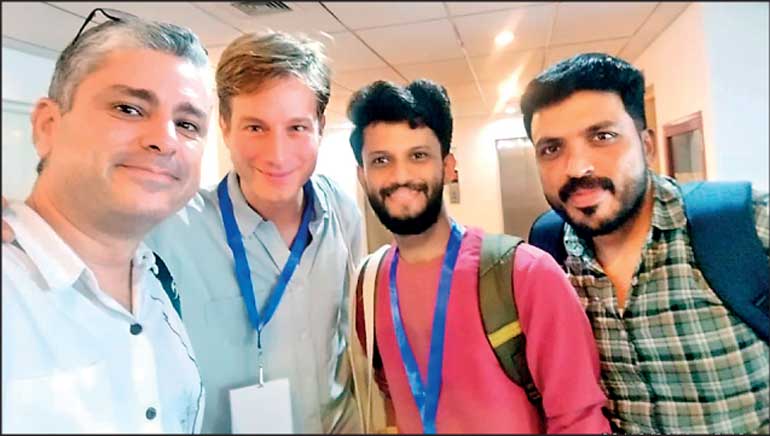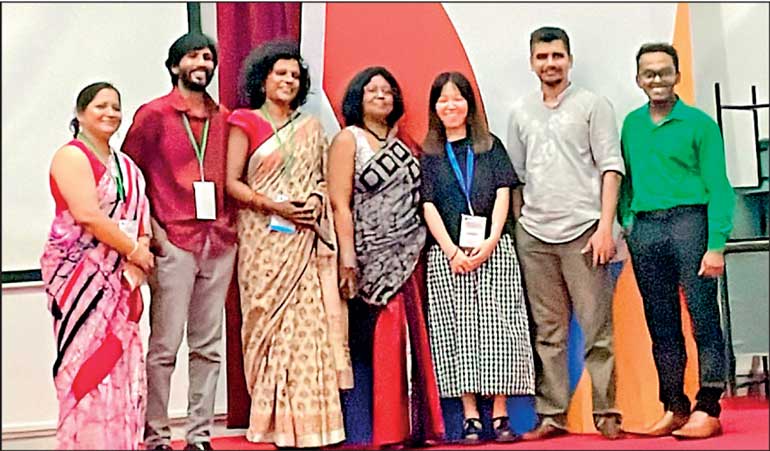Tuesday Feb 17, 2026
Tuesday Feb 17, 2026
Saturday, 16 December 2023 00:02 - - {{hitsCtrl.values.hits}}



By Surya Vishwa
One of the problems of modern life could be that it has compartmentalised realms of knowledge into tight cocoons and this strict segmentation, while justified at times on grounds that specialisation is needed (and indeed it is) has cost the world because the education sector of the industrialised world has not integrated the parallel world of arts from which springs the fountain of inspiration. It is inspiration that leads to innovation and innovation propels the world. A dry and stale academia or a mind operated upon the lab of over analysis and theorisation resembles more of a sterilised humanity where the core of meaning has been removed. In comparison a collective vibrant mental sphere created by scholarship connecting the dots with the wide network of arts, spirituality and representing all that is indigenous in mother earth, will not engineer robotic minds.
It is the concept of love that reigns in academic research when it seeks to espouse the voice of communities that might be smaller in numbers in society and thus at times not be heard fully. To feature such underrepresented minority cultures of music and the humanistic unravelling behind such intangible cultural heritage is what ICTMD does in organizing such events of which the world needs more, to move the consciousness of humanity towards empathy and understanding
In the light of the above, a most enlightening international academic forum this writer attended in the recent past was held in Sri Lanka last week. The Weekend FT featured the launching ceremony of the event in the Harmony page.
Today we continue the coverage of the themes presented and the details of the relevant local and international scholars within the first two days of the event who presented their work at the 12th Symposium of the ICTMD Study Group on Music and Minorities with a joint day with the Study Group on Indigenous Music and Dance.
Last week our focus was the socio-economic importance of such events being held in Sri Lanka. This week we focus on the alignment of the practice and theory and the relevance of music and minority rights to create a just and harmonious humanity that was the original goal in the formation of the ICTMD some decades ago. In the weeks to come we will feature more on this theme and follow up with an interview with Prof. Svanibor Pettan, the President of the organisation. This is part of the effort of the Harmony page to research and ideate on the multifarious aspects for mainstreaming all forms of aesthetic and arts into the national economic policy making process within the overarching goal of using arts for national prosperity and unity.
The 12th Symposium of the ICTMD Study Group on Music and Minorities was held in Colombo organised by the Kelaniya University Department of Fine Arts and in collaboration with the Sri Lanka Tourism Promotion Bureau and Sri Lanka Convention Bureau. The initiative and the back breaking work of finding the necessary support and leading the organising of the event was shouldered by the ICTMD Sri Lankan representative Dr. Lasanthi Manaranjani of the Kelaniya University.
Our exclusive coverage of the event held last week can be accessed from the following link; https://www.ft.lk/harmony_page/12th-Symposium-ofICTMD-Study-Group-on-Music-and-Minorities/10523-756109
As highlighted earlier the symposium provided a very rare combination of a practice based approach with the theoretical and a range of musical performances practised by diverse minority communities in Sri Lanka including, differently abled children and youth with the theme as Love.
Love, the single word that could describe the origin of every religion and what connects the entire fabric of the human psyche is hardly associated today with knowledge creation, and that could be the reason for wars and inequality in this purportedly educated world. Yet, incorporating as one of the main performances at the event, a choir conducted by musician Nadun Hettiarachchi featuring differently abled children and youth performing a special song on love, set the tone for the entire symposium which was academic in nature and a classic example of how the academia can embrace the final goal of standing up for a meaningful world.
It is the concept of love that reigns in academic research when it seeks to espouse the voice of communities that might be smaller in numbers in society and thus at times not be heard fully. To feature such underrepresented minority cultures of music and the humanistic unravelling behind such intangible cultural heritage is what ICTMD does in organizing such events of which the world needs more, to move the consciousness of humanity towards empathy and understanding.
The first academic presentation at the event was on Translocal soundscapes and strategic positionings: Navigating a sense of belonging in multiethnic multireligious Malaysia by Tan Sooi Beng of the University of Sains Malaysia, Penang, Malaysia provided a very interesting tapestry of the intricate fabric of culture in Malaysia that may be missed out in general.
The crisis of representation in ethnomusicological minority studies was the presentation by Marko Kölbl University of Music and Performing Arts Vienna, Austria and Rasika Ajotikar University of Hildesheim, Germany providing much insight for policy ideating on the need for incorporation of equal rights and representation of cultures of diverse communities that is small in number and whose cultural traditions differ from the mainstream.
Zuzana Jurková of the Charles University in Prague, Czechia presented her paper on the topic ‘Who counts as the nation’, a contribution to dialogic knowledge production, providing insight into the multifarious dynamics that are subtle and overt in the debate on the encompassing of the people of nation-state. Although presented in this particular research as specific to the Czech Republic, the topic is applicable to any country within the modern sphere of migration and societal evolution.
Engineering the minorities: Intangible cultural heritage preservation and transformations of folk music in 21st century mainland China was the academic paper presented by Kai Tang from the Music and Performing Arts University Vienna, Austria, contributing to the body of narratives on the representation of minority music in China.
Mark Hsiang-Yu Feng from the California University, Davis, USA presented a paper on the topic, Beyond neo-traditional: A non-linear triangular model for studying folk music revival in postcolonial Taiwan.
The venues of the minorities’ music: The case of Romani and ABCMMS in Slovenia was the presentation by Alma Bejtullahu of the Ljubljana University, Slovenia, providing diverse aspects into the cultural identities of the Romani people, the minority community of Europe with Indo-Aryan lineage.
Ming Yue from the York University United Kingdom made a presentation on the stylistic formation of the “Individual Voice” of contemporary Chinese composers focusing on the rethinking of the cultural collision in music writing based on Chen Qigang’s stylistic declaration. Chen Qigang is a Chinese born French composer.
Haozhe Zhang of the Central Conservatory of Music in Beijing, China shared on the possibility of the modernisation of Khoomii in China: Taking Sainkho Namtchylak, Huun-Huur-Tu and Hanggai as examples providing short videos of the Mongol-Tuvan throat (overtone) singing heritage, the technique known as the khoomei music tradition.
Pankaj Rawat of Jamia Millia Islamia, New Delhi, India presented a paper on sacred ethnomusicology and religious music practices in Uttarakhand Himalayas focusing on the shaping of social spaces of identity, belongingness, and community caste roles.
Essica Marks of the Zefat Academic College in Zefat, Israel made a presentation on Arab music as a cultural field of negotiations in the Israeli cultural arena asking the question, Whose music is this?
Carol Silverman from the Oregon University, Eugene in USA shared a paper on the topic from Diaspora to intersectional performative mobilities: Music-making in transcultural Balkan Romani communities juxtaposing the social and the individual saga and paradoxes of identity as manifested through music and culture belonging to the Romani people of the Balkans.
Ana Hofman from the Slovenian Academy of Sciences and Arts in Ljubljana, Slovenia made a presentation on the classy” Trubači: Economies of “Othering” and the Balkan brass bands in Slovenia.
Elena Marushiakova and Veselin Popov from the Institute of Ethnology and Social Anthropology of the Slovak Academy of Sciences, Bratislava, Slovakia made a presentation on the topic minority vs. majority: The case of the origin of a Roma/Gypsy song.
Petr Nuska Slovak of the Academy of Sciences, Bratislava in Slovakia made a presentation on the Hopa lide through an ethnomusicological documentary on (and with) Slovak Romani musicians, showing the power of representing research through the audio-visual form.
On the Theme: Music, Dance, and Minorities across the Indian Ocean chaired by Chinthaka P. Meddegoda, Mohammad Jahangir Hossain, independent scholar, Dhaka, Bangladesh presented on music keep-up hopes to the vulnerable and K.M Manoj Sanjeewa from the University of the Visual and Performing Arts, Colombo, Sri Lanka made a presentation on enhancing music education in Muslim schools in Sri Lanka: A proposal for action.
Since the research covered four days that the ICTMD symposium was held, from 4 to 8 December the topics featured above are only of the first few sessions. To do justice to the topics of the entire conference of this vast international stature, the Harmony page will be serialising as relevant for the purpose of sharing the knowledge presented at this event.